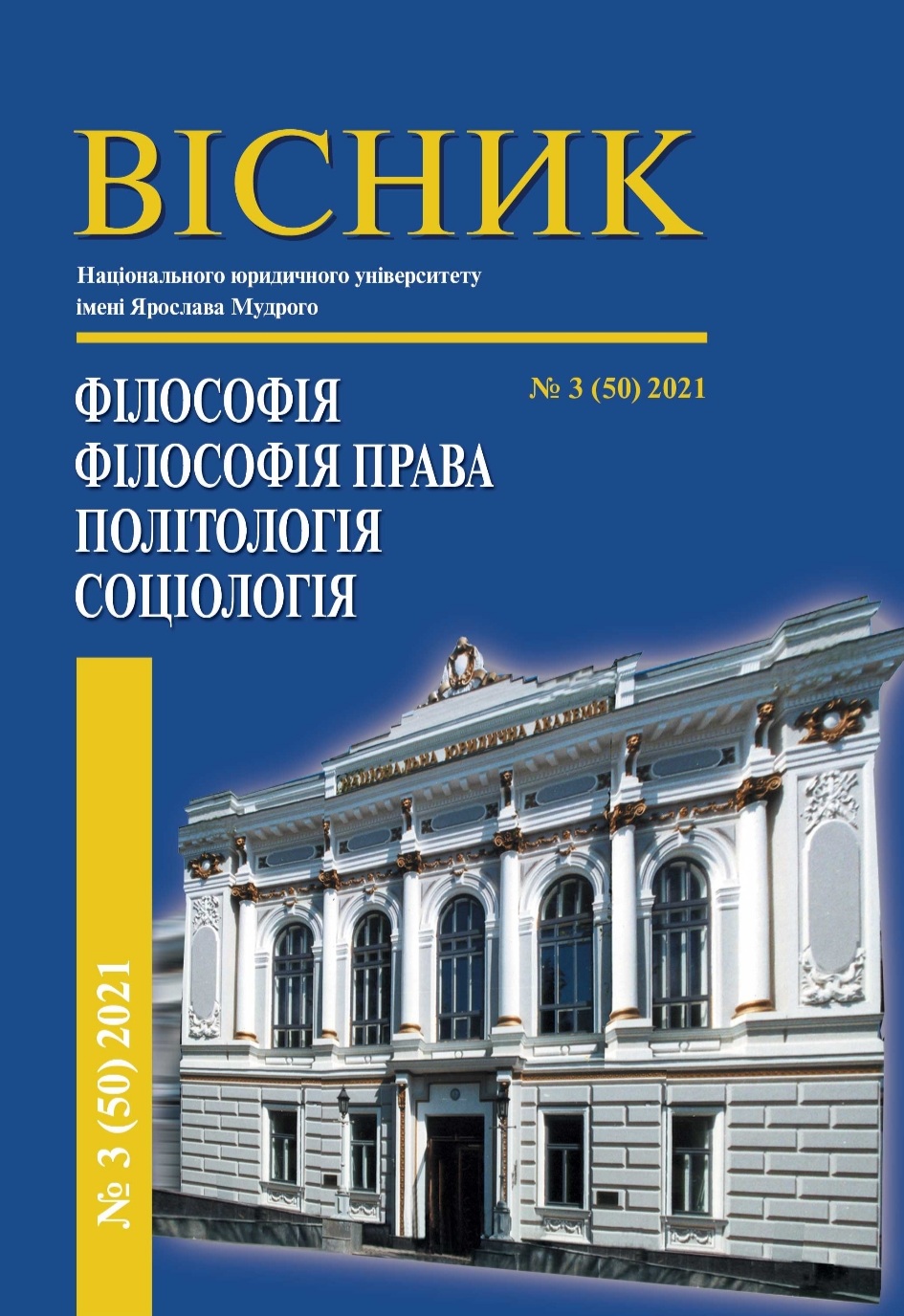ПОСТПАНОПТИКУМ: МЕТАМОРФОЗИ КУЛЬТУРИ КОНТРОЛЯ В ЦИФРОВОМУ СУСПІЛЬСТВІ
DOI:
https://doi.org/10.21564/2663-5704.50.235268Ключові слова:
соціальний контроль, постпаноптикум, інформаційне суспільство, цифровізація, владаАнотація
Стаття присвячена аналізу особливостей практик контроля у ситуації «текучого модерну». За точку відліку взята метафора паноптикуму, запропонована М. Фуко. Розглянуто характерні риси цифрової інфраструктури соціального контроля. Показані особливості баноптичної та синоптичної логіки стеження як постпаноптичних форм соціального контроля. Гнучкість та варіативність контроля, уможливлені новітніми дигітальними технологіями, свідчать про специфічно новий модус відносин між владою та людиною.
Посилання
Fuko, M. (1999). Nadzirat` I nakazyvat`: Rozhdenie tjur`my. Moskva: «Ad Marginem». https://www.gumer.info/bibliotek_Buks/History/Fuko_Tyrm/index.php. (Last accessed: 08.06.2021) [in Russian].
Foucault, M. (1980). Power/knowledge selected interviews and other writings, 1972-1977. New York: Pantheon.
Deleuze, G. (1990). Postscript on the Societies of Control https://theanarchistlibrary.org/library/gilles-deleuze-postscript-on-the-societies-of-control (Last accessed: 05.05.2021).
Deleuze, G. & Guattari, F. (2005). A Thousand Plateaus, Capitalism and Schizophrenia, tr. B. Massumi. London: University of Minnesota Press.
Basturk, E. A brief analyse on post panoptic surveillance: Deleuze&Guattarian approach. International Journal of Social Sciences. 2017. Vol. VI, No 2. Р. 1–17.
Steger, M. (2009). Globalization: A Very Short Introduction. New York: Oxford University Press.
Finchelstein, G. (2013). La dictature de l'urgence. Paris: Fayard [in French].
Beck, U. (2017). The Metamorphosis of the World. Cambridge Malden: Polity Press.
Taleb, N. (2018). Skin in the Game: Hidden Asymmetries in Daily Life. New York: Random House & Penguin.
Biryukov, S. V., Chirun, S. N., Andreev, А. V. (2021). Global`nyj publichnyj porjzdok i ego izmenemija. Vestnik Tomskogo gosudarstvennogo universiteta Filosofiya. Sociologiya. Politologiya, 59, 199–212 [in Russian].
Danilyan, O.G., Dzeban, A.P., Kalinovsky, Y.Y., Kalnytskyi E.A. et al. (2018). Personal information rights and freedoms within the modern society. Informatologia, 51 (1-2), 24–33.
Bytiak,Y., Danilyan, O., Dzeban, A., Kalinovsky Y. et al. (2020). Information society: the interaction of tradition and innovation in communicative processes. Amazonia investiga. Vol. 9, 27, 217–226.
Getman, A.P., Danilyan, O.G., Dzeban, A.P., Kalinovsky et al. (2020). Information security in modern society: Sociocultural aspects. Amazonia Investiga. Vol. 9, 25, 6–14.
Andrejevic, M., Gates, K. (2014). Big data surveillance: introduction. Surveillance and Society. Vol. 12, 2.185–196.
Birchall, C. (2016). Shareveillance: subjectivity between open and closed data. Big Data and Society. Vol. 3, 2.1–12.
Creemers, R. (2017). Cyber China: upgrading propaganda, public opinion work and social management for the twenty-first century. Journal of Contemporary China. Vol. 26, 103, 85–100.
Hintz, A., Dencik, L., Wahl-Jorgensen, K. (2019). Digital citizenship in a datafied society. Cambridge: Polity Press.
Boyne, R. (2000). Post-Panopticism. Economy and Society. Vol. 29, 2, 285–307.
Mathiesen, T. (1997). The Viewer Society: Michel Foucault's «Panopticon» Revisited. Theoretical Criminology. Vol. 1, 2, 215–234.
Lyon, D., Bauman, Z. (2013). The Liquid Surveillance: A Conversation. Oxford: Wiley.
Lyon, D. (2010). Liquid Surveillance: the Contribution of Zygmunt Bauman to Surveillance Studies. International Political Sociology. Vol. 4, 325–338.
Bigo, D. (2014). The (in) securitization practices of the three universes of EU border control: Military/Navyborder guards/police database analysts. Security Dialogue. Vol. 45, 3, 209–225.
Foucault, M. (2003). The Birth of the Clinic an Archeology of Medical Perception. New York: Routledge.
Wacquant, L. (2009). Punishing the Poor: The Neoliberal Government of Social Insecurity. Durham: Duke University Press.
Bauman, Z. (2011). 44 Letters from the Liquid Modern World. Cambridge: Polity Press.
Ruggie, J. G. (1993). Territoriality and Beyond: Problematizing Modernity in International Relations. International Organization. Vol. 47,1, 139–174.
Bauman Z. (2004). Wasted lives. Modernity and its outcasts. Cambridge: Polity Press.
Baudrillard, J. (1981). For A Critique of the Political Economy of the Sign. New York: Telos Press.
Lyon, D. (1994). The Electronic Eye. The Rise of Surveillance Society. Cambridge: Polity Press.
Gibson, W. (2010, August, 31). Google’s Earth. New York Times. URL: https://www.nytimes.com/2010/09/01/opinion/01gibson.html (Last accessed: 15.04.2021).
Bauman, Z., Lyon, D. (2013). Daten, Drohnen, Disziplin Ein Gespräch über flüchtige Überwachung. Berlin. Suhrkamp Verlag AG [in German].
Webster, G., Kim, S. (2018). The data arms race is no excuse for abandoning privacy. Foreign Policy. URL: https://foreignpolicy.com/2018/08/14/the-data-arms-race-is-no-excuse-for-bandoning-privacy/ (Last accessed: 18.04.2021).
Bach, J. (2020). The red and the black: China’s social credit experiment as a total test environment. British Journal Of Sociology. Vol. 71, 3, 489–502.
Andrejevic, M. (2006). The Discipline of Watching: Detection, Risk, and Lateral Surveillance. Critical Studies in Media Communication. Vol. 23, 5, 391–407.
Bigo, D. (2011). Security a field left fallow. Foucault on Politics, Security and War / eds. M. Dillon, A.W. Neal. London: Palgrave Macmillan, 94–95.
Bigo, D. (2008). Globalized (in) security: the field and the ban-opticon. Terror, insecurity and liberty: illiberal practices of liberal regimes after 9 (11). London: Routledge.
Hier, S. (2003). Probing the Surveillant Assemblage: On the Dialectics of Surveillance Practices as Processes of Social Control. Surveillance and Society. Vol. 1, 3, 399–411.
Agamben, G. (2005). State of Exception. Chicago: The University of Chicago Press.
Bauman, Z. (2004). Globalizacija. Posledstvija dlja cheloveka i obshchestva. Moskva: Ves' Mir [in Russian].
Didier Bigo explains the Ban-opticon (2013). https://djmilosz.wordpress.com/2013/03/12/didier-bigo-explains-the-ban-opticon/ (Last accessed: 20.06.2021).
Bauman, Z. (2009). Wir Lebenskünstler. Frankfurt am Main: Suhrkamp [in German].
Welzbacher, C. (2011). Der radikale Narr des Kapitals. Jeremy Bentham, das „Panoptikum“ und die „Auto-Ikone“. Berlin: Matthes & Seitz [in German].



